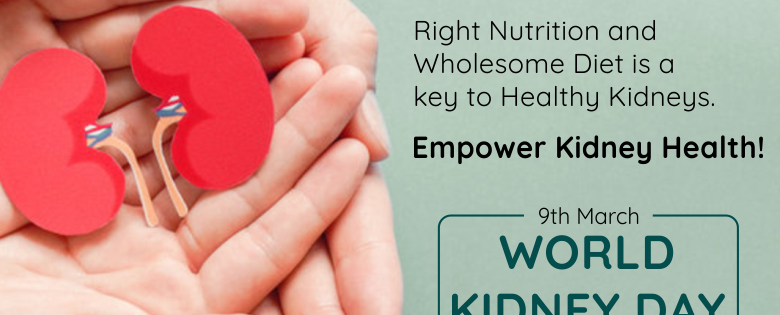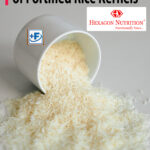

Right Nutrition and Wholesome Diet – A Key to Healthy Kidneys
Every year, 850 million people worldwide are diagnosed with incapacitating kidney diseases, with a growing number of new cases being diagnosed. Chronic Kidney Disease (CKD) is a public health concern due to the significant morbidity and mortality it causes. In 2019, it was responsible for 1.4 million deaths worldwide. Every year, over 175,000 people in India receive dialysis or a kidney transplant. The reported prevalence of CKD in different regions ranges from 1% to 13%, and the aetiology of CKD varies significantly across India. Kidney disease affects one out of every ten people worldwide!
As most people are aware, one of the primary functions of the kidneys is the removal of waste products and excess fluid from the body. Urine removes waste products as well as excess fluid. A number of complex excretion and re-absorption steps are involved in the production of urine, this process is necessary to maintain the body’s chemical balance. The kidneys control the body’s salt, potassium, and acid levels. Furthermore, the kidneys produce hormones that regulate the function of other organs.
Harmful elements for your kidneys:
Chronic kidney disease can be caused by a variety of factors. Diabetes and high blood pressure are two diseases that can harm the kidneys. Some kidney diseases are inherited (run in families). Others may be congenital, which means people are born with an abnormality that affects their kidneys also when germs enter the urinary tract they cause infections. These infections typically affect the bladder, but they can also spread to the kidneys, resulting in fever and back pain. Toxins and drugs can also cause kidney problems. Long-term use of a large number of over-the-counter pain relievers may be harmful to the kidneys. Other medications, toxins, pesticides, and “street” drugs like heroin and crack can also harm the kidneys. Overconsuming alcohol and painkillers can also lead to major problems.
Symptoms commonly observed in kidney disease:
Wastes and excess fluid may accumulate in the body if the kidneys’ ability to filter blood gets damaged by disease. Although many forms of kidney disease do not produce symptoms until late in the disease’s progression, there are six kidney disease-warning signs:
- Hypertension (high blood pressure), then the presence of blood and/or protein in the urine. Wastes and excess fluid may accumulate in the body if the kidney’s ability to filter blood is severely impaired by disease. Although many forms of kidney disease do not produce symptoms until late in the disease’s progression.
- A creatinine and Blood Urea Nitrogen (BUN) blood test that is above normal. When your kidney function is impaired, wastes such as BUN and creatinine accumulate in your blood, and your GFR (glomerular filtration rate) is below 60. GFR, which assesses kidney function, frequent urination, especially at night; difficult or painful urination, puffiness and swelling in the hands and feet
The action of a protein in the functioning of kidneys
Proteins with high biological value contain all of the essential amino acids in approximately the same amounts that the body requires. The biological value is a measurement of how well the body utilizes protein from the diet. A high-value food contains a high supply of essential amino acids. HBV surface proteins have a variety of functions in cellular infection, viral synthesis, and host immune responses. A protein-rich diet is essential for fighting infection, healing wounds, and maintaining a healthy nutritional status. However, many dialysis patients simply do not consume enough protein.
This is where protein supplements come in handy. Protein supplements, such as HBV and WHEY, are frequently recommended for dialysis patients to bridge the gap between how much protein you consume and how much protein you require. Toxins and waste products are removed during the dialysis process. This is managed to accomplish either through the blood or through the abdomen. Some protein is filtered along with the toxins and wastes in both of these methods. This is why many dialysis patients are advised to consume protein supplements with a wholesome diet.
The significance of electrolytes and fluids control:
To regulate the osmolality and volume of body fluids, the kidneys match renal excretion to water and electrolyte intake. Water and electrolyte deficits can be adjusted by increasing intake and retention, whereas excesses can be compensated for by increasing urinary excretion. It is commonly assumed that water excretion determines osmolality and electrolyte excretion (primarily NaCl) determines fluid volume; however, regulation of both is required. A variety of factors can impair the kidneys’ ability to do their vital work. These include diabetes and high blood pressure, as well as inflammation and a variety of inherited conditions. Key mineral deficiencies and excesses such as calcium and phosphorous, electrolyte imbalances such as sodium and potassium, dehydration, and fluid retention can all have their origins in the kidneys.
Maintain healthy kidneys with right nutrition:
Do not overdose on certain medicines. Take it only when your doctor thinks it is necessary. Be careful with antibiotics. Medications that fight these bacteria can damage the kidneys with frequent use, which is more serious when the kidneys are not working properly, but can also occur when the kidneys are perfectly healthy. Eating a healthy diet and consuming nutritious foods with the addition of vitamins and minerals through supplements can keep your overall health in good shape because it is not only good for a healthy body but also good for a malnourished body. Over time, an inadequate diet can lead to high blood pressure, obesity, diabetes, and other conditions that strain the kidneys, eat very little processed food. When you drink enough water, water helps deliver important nutrients to the kidneys and helps carry waste products to the bladder in the form of urine.
Maintain a blood pressure of less than 140/90, or consult your doctor about the best blood pressure target for you. Maintain your target cholesterol level. Reduce your salt intake; eat more fruits and vegetables; stay active; and take your medications as directed.
Healthy Kidneys Lead to Healthier Life!



